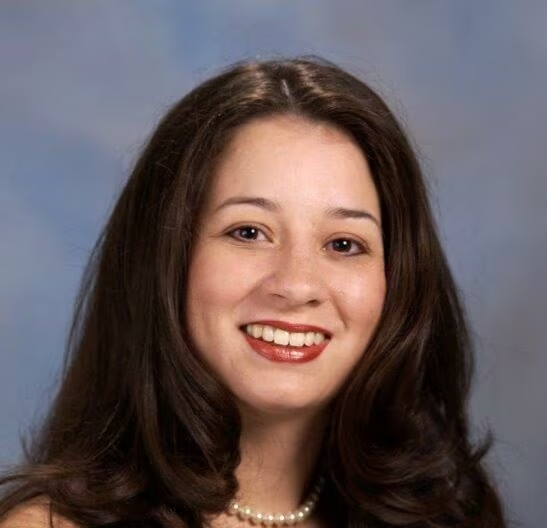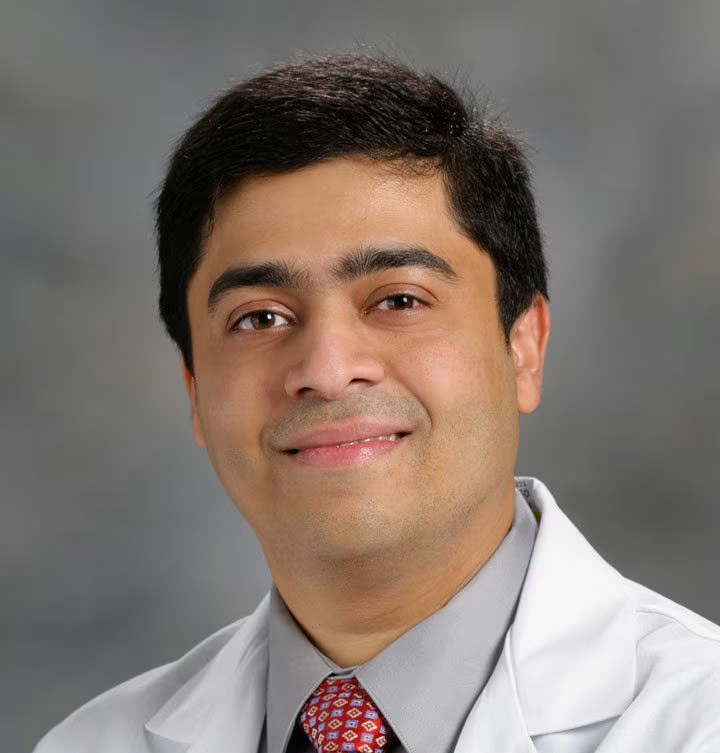touchEXPERT OPINIONS Personalized treatment of RET-altered thyroid cancers: What is the value of biomarker testing and targeted therapies?
Leading experts explain the value of biomarker testing and targeted therapies for the personalized treatment of RET-altered thyroid cancers
Prof. Maria Cabanillas outlines the different types of thyroid cancer, their epidemiology and the range of multikinase and targeted kinase inhibitor therapies available for the management of thyroid cancer.
1/3 Next InterviewIn this interview Prof. Cabanillas answers the following questions:
- Can you describe the different types of thyroid cancer and the epidemiology of the disease?
- Can you outline the different multikinase inhibitors and their uses in the treatment of thyroid cancer?
- What, in your experience, are the limitations of multikinase inhibitors in the treatment of thyroid cancer?
- Can you outline the available targeted kinase inhibitors and their uses in the treatment of thyroid cancer?
- Can you describe the adverse effects you have seen associated with targeted kinase inhibitors?
Prof. Maria Cabanillas is an Oncologic Endocrinologist and tenured Professor at the University of Texas MD Anderson Cancer Center in Houston, TX, USA. read more
As a clinician and clinical researcher, Prof. Cabanillas treats both early and advanced thyroid cancers, including anaplastic thyroid cancers (ATC). She led the effort to create a rapid response team for ATC and completed her service on the 2021 ATC Guidelines Committee for the American Thyroid Association that were recently published.
Prof. Maria Cabanillas discloses Advisory board or panel fees from Bayer, Eli Lilly and Exelixis. Consultancy fees from Bayer and Eli Lilly. Grant research/support from Genentech and Merck.
Dr Vivek Subbiah explains the concept of RET alterations in thyroid cancer, the methods available to detect these biomarkers, and how detecting RET alterations can influence treatment decision making and patient outcomes.
2/3 Next InterviewIn this interview Dr Subbiah answers the following questions:
- What is currently known about RET alterations in patients with thyroid cancer and how these alterations affect patient prognosis?
- What methods are available to detect RET alterations and what, in your opinion, are the challenges faced by clinicians with each method?
- What are the benefits of detecting RET alterations in patients with thyroid cancer and how can the information be used for treatment decision-making?
Dr Vivek Subbiah is the clinical medical director of the Clinical Center for Targeted Therapy at The University of Texas MD Anderson Cancer Center in Houston, TX, USA. read more
Dr Subbiah is also an associate professor, clinical trialist and physician investigator in the Department of Investigational Cancer Therapeutics at the University of Texas MD Anderson Cancer Center in Houston, TX, USA.
Dr Subbiah is a major advocate for precision oncology. His national leadership roles continue to expand as the national principal investigator for the BRAF non-V600 alteration arm of the NCI-MATCH Precision Medicine Clinical Trial. His trial portfolio includes trials that target BRAF, MEK, RET, CDK, WNT, VEGF, mTOR and EZH2-EED pathways; novel immunotherapy combination trials GITR, TLR7/9, PD1 and WT1; and several first-in-human trials of antibody–drug conjugates, oncolytic viruses, intra-tumoral therapies and radiopharmaceuticals.
He has published over 150 peer-reviewed articles in several prestigious journals such as the New England Journal of Medicine, Journal of Clinical Oncology, JAMA Oncology, Cancer Discovery, Clinical Cancer Research and Lancet Oncology.
Dr Vivek Subbiah discloses Advisory board or panel fees from Daiichi Sankyo, Eli Lilly/LOXO Oncology, Helsinn, Incyte, Medimmune, Novartis, QED Pharma, Relay Therapeutics, Roche and Signant Health. Consultancy fees from Daiichi Sankyo, Eli Lilly/LOXO Oncology, Helsinn, Incyte, Medimmune, Novartis, QED Pharma, Relay Therapeutics, Roche and Signant Health. Grant research/support from Abbvie, Agensys, Alfasigma, Altum, Amgen, Bayer, Berghealth, Blueprint Medicines Corporation, Boston Biomedical, Boston Pharmaceuticals, Celgene, D3, Dragonfly Therapeutics, Eli Lilly/LOXO Oncology, Exelixis, Fujifilm, GlaxoSmithKline, Helsinn Pharmaceuticals, Idera Pharma, Incyte, Inhibrx, Medimmune, Multivir, Nanocarrier, Northwest Biotherapeutics, Novartis, Pfizer, Pharmamar, Roche/Genentech, Takeda, Turning Point Therapeutics and Vegenics. Other financial or material support (royalties, patents, etc.) from Incyte and Pharmamar.
Dr Lori Wirth reviews the latest efficacy and safety data on targeted tyrosine kinase inhibitor therapies for patients with RET-altered thyroid cancers, and their implications for clinical practice.
3/3 Take CE/CME TestIn this interview Dr Wirth answers the following questions:
- What does the latest clinical evidence tell us about the efficacy of pralsetinib in RET-altered thyroid cancers?
- What does the latest clinical evidence tell us about the efficacy of selpercatinib in RET-altered thyroid cancers?
- What can you tell us about the toxicity profiles of pralsetinib and selpercatinib, and how they compare with multikinase inhibitors?
- What are the implications of the efficacy and safety data for pralsetinib and selpercatinib for daily clinical practice?
Dr Lori Wirth is The Elizabeth and Michael Ruane Chair of Endocrine Oncology and Medical Director of Massachusetts General Hospital’s Center for Head and Neck Cancers, Boston, MA, USA. read more
She is also an Associate Professor in Medicine at Harvard Medical School. In addition to overseeing the Center for Head and Neck Cancers, Dr Wirth co-directs Massachusetts General/Massachusetts Eye and Ear’s Advanced Thyroid Cancer Clinic. Dr Wirth received her BA from Brown University and her MD from Columbia’s College of Physicians and Surgeons. She trained at New York Presbyterian Hospital and Dana-Farber/Harvard Cancer Center.
Dr Wirth is an international authority in advanced thyroid cancer and head and neck oncology. Her research focuses on clinical trials and leveraging translational data to maximize the impact of trial outcomes.
Dr Wirth has served as Chairperson of the International Thyroid Oncology Group, and sits on a number of national and international oncology committees, including the National Comprehensive Cancer Network (NCCN)’s Thyroid Committee and the American Board of Internal Medicine (ABIM)’s Medical Oncology Exam Committee.
Dr Lori Wirth discloses Advisory board or panel fees from Bayer HealthCare Pharmaceuticals, Blueprint Medicines, Eli Lilly and Exelixis. Consultancy fees from Eisai.
Overview & Learning Objectives
Overview
In this activity, thyroid cancer specialists share their perspectives on key aspects of RET-altered thyroid cancers, including the epidemiology of the disease, the importance of biomarker testing and the latest data on targeted therapies for patients with RET alterations.
This activity is jointly provided by USF Health and touchIME. read more
Target Audience
This activity has been designed to meet the educational needs of oncologists, oncology surgeons, endocrinologists, nuclear medicine physicians, radiologists, pathologists and oncology nurse specialists involved in the management of patients with thyroid cancer.
Disclosures
USF Health adheres to the Standards for Integrity and Independence in Accredited Continuing Education. All individuals in a position to influence content have disclosed to USF Health any financial relationship with an ineligible organization. USF Health has reviewed and mitigated all relevant financial relationships related to the content of the activity. The relevant relationships are listed below. All individuals not listed have no relevant financial relationships.
Faculty
Prof. Maria Cabanillas discloses Advisory board or panel fees from Bayer, Eli Lilly and Exelixis. Consultancy fees from Bayer and Eli Lilly. Grant research/support from Genentech and Merck.
Dr Vivek Subbiah discloses Advisory board or panel fees from Daiichi Sankyo, Eli Lilly/LOXO Oncology, Helsinn, Incyte, Medimmune, Novartis, QED Pharma, Relay Therapeutics, Roche and Signant Health. Consultancy fees from Daiichi Sankyo, Eli Lilly/LOXO Oncology, Helsinn, Incyte, Medimmune, Novartis, QED Pharma, Relay Therapeutics, Roche and Signant Health. Grant research/support from Abbvie, Agensys, Alfasigma, Altum, Amgen, Bayer, Berghealth, Blueprint Medicines Corporation, Boston Biomedical, Boston Pharmaceuticals, Celgene, D3, Dragonfly Therapeutics, Eli Lilly/LOXO Oncology, Exelixis, Fujifilm, GlaxoSmithKline, Helsinn Pharmaceuticals, Idera Pharma, Incyte, Inhibrx, Medimmune, Multivir, Nanocarrier, Northwest Biotherapeutics, Novartis, Pfizer, Pharmamar, Roche/Genentech, Takeda, Turning Point Therapeutics and Vegenics. Other financial or material support (royalties, patents, etc.) from Incyte and Pharmamar.
Dr Lori Wirth discloses Advisory board or panel fees from Bayer HealthCare Pharmaceuticals, Blueprint Medicines, Eli Lilly and Exelixis. Consultancy fees from Eisai.
Content reviewer
Nurse planner and peer reviewer Alicia Canalejo, APRN, has no financial interests/relationships or affiliations in relation to this activity.
Touch Medical Director
Sola Neunie has no financial interests/relationships or affiliations in relation to this activity.
USF Health Office of Continuing Professional Development and touchIME staff have no financial interests/relationships or affiliations in relation to this activity.
Requirements for Successful Completion
In order to receive credit for this activity, participants must review the content and complete the post-test and evaluation form. Statements of credit are awarded upon successful completion of the post-test and evaluation form.
If you have questions regarding credit please contact cpdsupport@usf.edu
Accreditations
Physicians
This activity has been planned and implemented in accordance with the accreditation requirements and policies of the Accreditation Council for Continuing Medical Education (ACCME) through a joint providership of USF Health and touchIME. USF Health is accredited by the ACCME to provide continuing medical education for physicians.
USF Health designates this enduring material for a maximum of 1.0 AMA PRA Category 1 CreditTM. Physicians should claim only the credit commensurate with the extent of their participation in the activity.
The European Union of Medical Specialists (UEMS) – European Accreditation Council for Continuing Medical Education (EACCME) has an agreement of mutual recognition of continuing medical education (CME) credit with the American Medical Association (AMA). European physicians interested in converting AMA PRA Category 1 CreditTM into European CME credit (ECMEC) should contact the UEMS (www.uems.eu)
Advanced Practice Providers
Physician Assistants may claim a maximum of 1.0 Category 1 credit for completing this activity. NCCPA accepts AMA PRA Category 1 CreditTM from organizations accredited by ACCME or a recognized state medical society.
The AANPCP accepts certificates of participation for educational activities approved for AMA PRA Category 1 CreditTM by ACCME-accredited providers. APRNs who participate will receive a certificate of completion commensurate with the extent of their participation.
Nurses
USF Health is accredited as a provider of nursing continuing professional development by the American Nurses Credentialing Center’s Commission on Accreditation.
A maximum of 1.0 contact hour may be earned by learners who successfully complete this continuing professional development activity. USF Health, the accredited provider, acknowledges touchIME as the joint provider in the planning and execution of this CNE activity.
This activity is awarded 1.0 ANCC pharmacotherapeutic contact hour.
Date of original release: 16 March 2022. Date credits expire: 16 March 2023.
If you have any questions regarding credit please contact cpdsupport@usf.edu
Learning Objectives
After watching this activity, participants should be better able to:
- Distinguish between different types of thyroid cancers and describe therapies that are appropriate for their management
- Plan a personalized approach to treatment of RET-altered thyroid cancers, including use of biomarker testing and novel targeted therapies
- Evaluate the clinical trial data for novel targeted therapies for RET-altered thyroid cancers and apply it to clinical practice

Register to touchENDOCRINOLOGY for FREE
- Peer-reviewed journals and expert opinions
- Interactive CME and e-learning modules
- Video conference highlights



